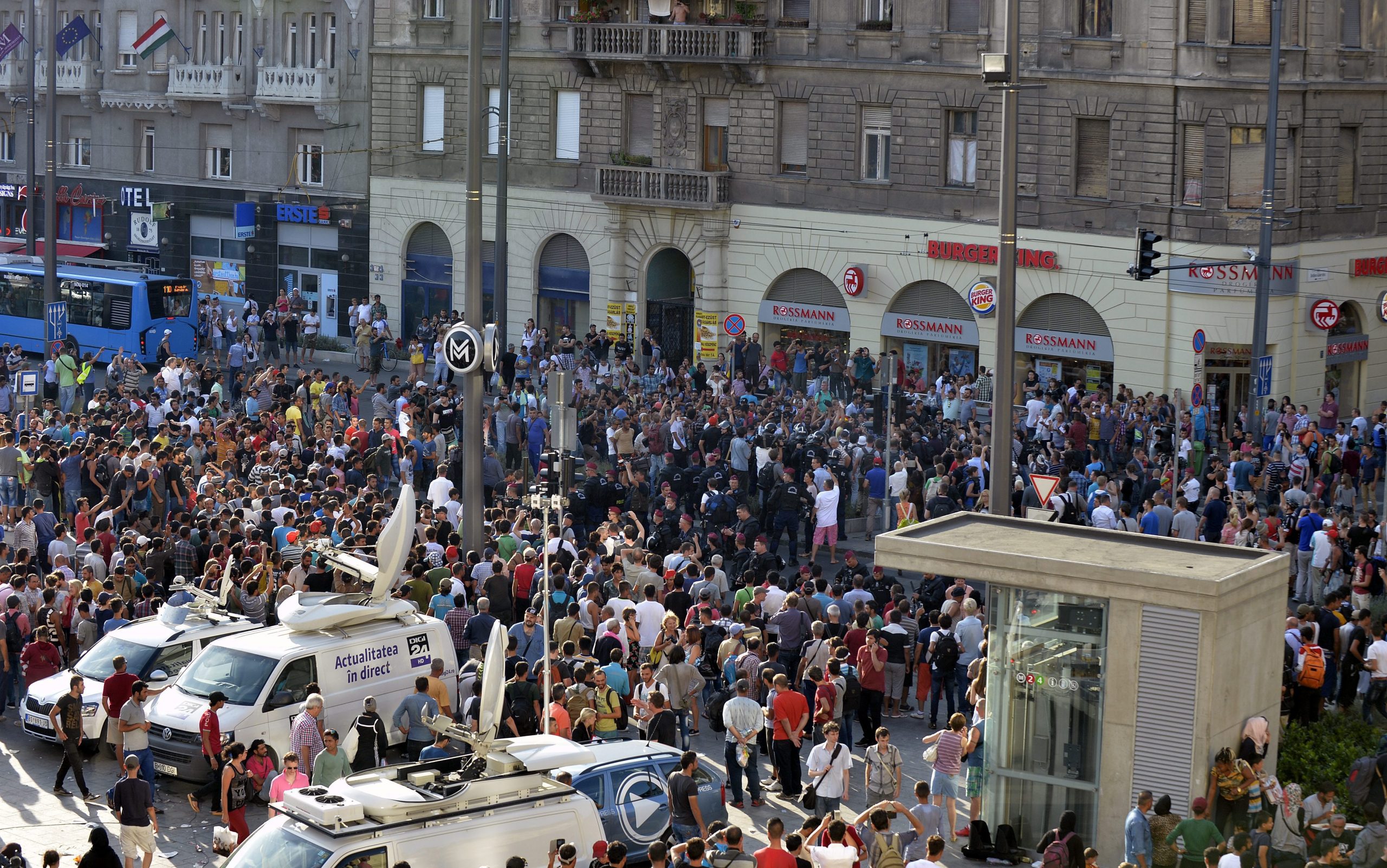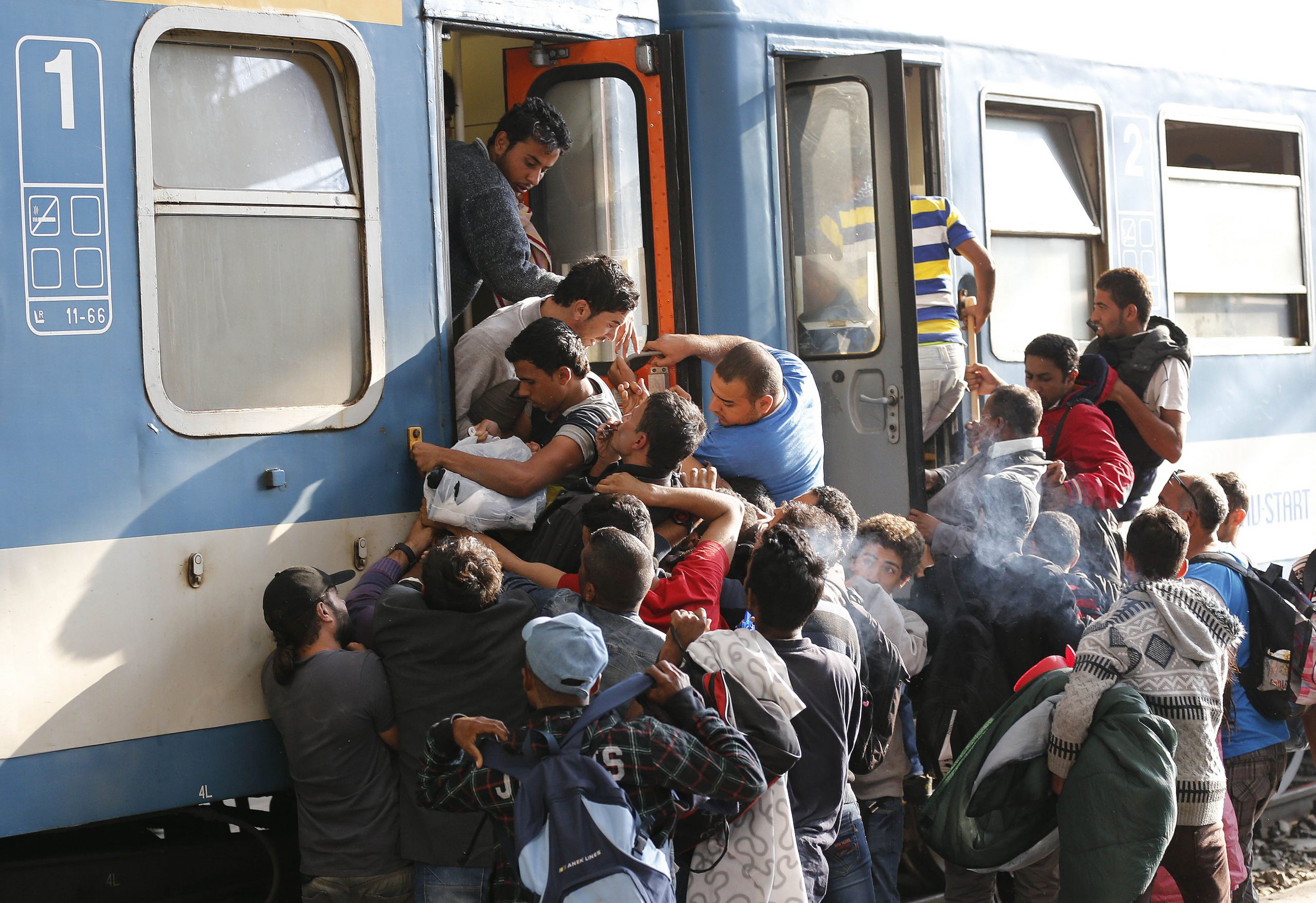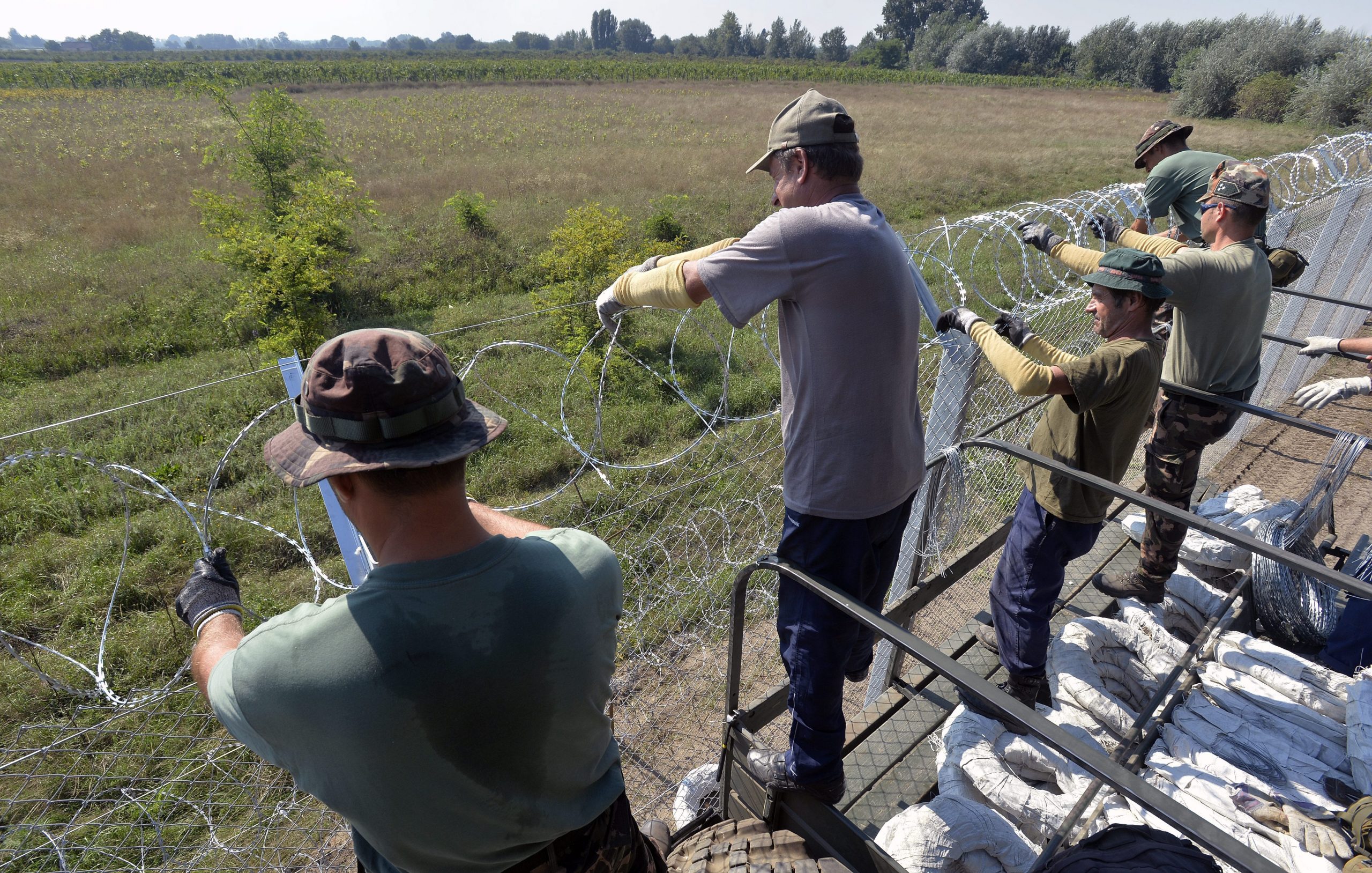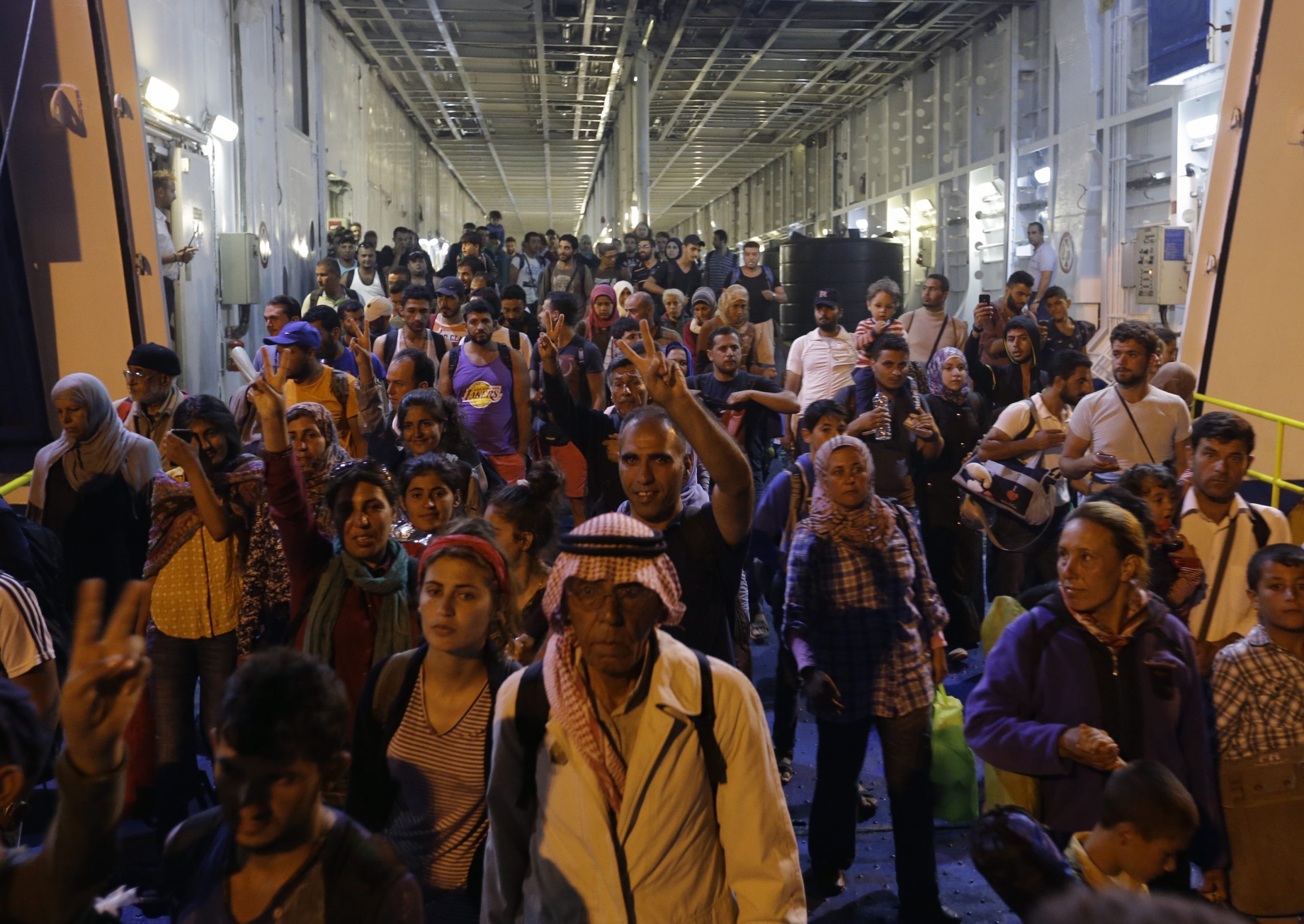Thousands of Syrian refugees were blocked this week from boarding trains in Hungary bound for Europe, creating a new flashpoint in what some say is the greatest refugee crisis that Europe has faced since World War II.
And while countless photos of Syrians looking for safety in Europe put the spotlight on Hungary, it also called attention to the deep divide among Europe’s major countries on how to handle the massive issue.
Many of the refugees from Syria’s ongoing civil war have tried to make their way through Turkey to Greece, and then deeper into Europe through Hungary. But outside a Budapest train station Thursday, hundreds of migrant families tussled with police who were refusing to allow them to board the trains they’d purchased tickets for.
Authorities stopped trains bound for Europe from leaving the station, dashing the migrants’ hopes of reaching Germany and forcing them to set up camp in Budapest’s eastern station for the second night in a row.

Migrants gather outside the closed Eastern Railway Station in Budapest, Hungary, after they were not allowed to board trains bound for Germany. (Zoltan Mathe/MTI via AP)
“Please help the Syrians. … The Syrians need help now. Just stop the war. We don’t want to stay in Europe, just stop the war,” 13-year-old Syrian refugee Kinan Masalmeh told Al Jazeera.
Four million people, the majority of the world’s refugees, have fled Syria, terrorized by Islamic State militants, torn apart by a five-year civil war and destroyed by a leader who is accused of using chemical weapons on his own people.

Migrants struggle to board a train at the railway station in Budapest, Hungary.(AP Photo/Frank Augstein)
As she surveyed the desperate situation in Budapest, German parliament member Annette Groth called it “a complete failure of human rights in Europe.”
“Massive human rights violations here — people sleeping on the streets for days and days and days,” Groth told Al Jazeera. “There’s hardly any water, hardly any food.”
As hundreds of thousands of refugees from Syria, Eritrea, Nigeria, Afghanistan, Iran, Somalia and sub-Saharan Africa wash up in the Mediterranean countries, Europe lacks a cohesive response to the crisis.
Germany, Italy and France have called for solidarity and in a joint statement asked for a “fair distribution” of the refugees throughout Europe. But the rest of Europe cannot agree on what to do.
Hungarian Prime Minister Viktor Orban has called the refugees a “German problem” and ordered army engineers to build a 13-foot wall along Hungary’s 109-mile border to keep the refugees out. About 150,000 refugees have poured into Hungary fleeing wars and persecution.
French foreign minister Laurent Fabius called Hungary’s response “extremely harsh” and disrespectful of European values.
“Hungary is part of Europe, which has values, and we do not respect those values by putting up fences,” said Fabius, according to The Telegraph.

Hungarian soldiers build the temporary fence on Hungary’s southern border with Serbia to halt illegal immigration. (Zoltan Mathe/MTI via AP)
Economically unstable Greece has taken in nearly 142,000 migrants since June 1 of this year, according to the International Organization for Migration. The United Nations High Commissioner for Refugees called the situation in Greece “total chaos.” Italy has taken in 107,000 refugees.
Knowing there is no hope of work in Greece, the refugees hope to move through Macedonia and Hungary into Austria and Germany and potentially into the Nordic states, looking for security and economic freedom.

Syrian migrants disembark from the catamaran Terra Jet at the Athens’ port of Piraeus. (AP Photo/Thanassis Stavrakis)
Sweden took in more refugees per capita than any other nation in Europe and offers Syrian refugees automatic residency. Though the country relies on assimilation, a goal that has not yet been reached with the influx of refugees, the majority of Swedes are proud of their country’s humanitarian record and are calling on the rest of Europe to follow their lead.
While Germany has pledged to take in 800,000 refugees by the end of this year, eight times the number it took in last year, Britain steadfastly refuses to take in more than 1,000 Syrian refugees. Pressure on Prime Minister David Cameron to accept more refugees mounted Thursday after an image of a 3-year-old Syrian boy’s lifeless body washed up on a Turkish beach went viral.
“Aylan Kurdi”, a Kurdish boy from #Kobane, Rojava (#Syria) He was only 3 when he drowned in the Med. sea pic.twitter.com/lW5KEUn5zQ
— curdistani (@curdistani) September 2, 2015
“Mr. Cameron, summer is over. … Now deal with the biggest crisis facing Europe since WW2,” blared the headline on the front page of the British newspaper the Sun above the heartbreaking image.
So far, Cameron has resisted calls to accept more refugees, saying he believes the only solution to the problem is “to try to bring peace and stability to that part of the world.”
“I don’t think there is an answer that can be achieved simply by taking more and more refugees,” said Cameron.
“This is a disgrace. That we are letting people die and seeing dead bodies on the beaches, when together, Europe is such a wealthy place. We should be able to fashion a short-term response, not just a long-term response,” said Cardinal Vincent Nichols, the head of the Catholic church in England and Wales, according to The Guardian.
“It is no longer an abstract problem of people on the scrounge. It’s not,” said the cardinal. “It’s people who are desperate for the sake of their families, their elderly, their youngsters, their children. And the more we see that the more the opportunity for a political response that is a bit more generous, is growing. What is screaming out is the human tragedy of this problem, to which we can be more generous.”
